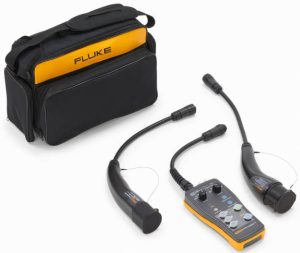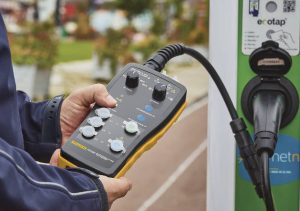Called the FEV300, it allows the output of a Mode 3 ac charger with connector types 1 and 2 to be tested in accordance with IEC/HD 60364-7-722 and IEC/EN 61851-1.
The stations provide a one or three phase supply at 230 or 400V. Mode 3 chargers provide 3.7 to 22kW, said Fluke, explaing: “For safety, communication between the charging station and the connected electric vehicle must occur before an output voltage is delivered. Adapters such as the FEV300 are critical pieces of equipment used in installation and mandatory routine testing of Mode 3 EVCS.”
The tests required, it continued, include continuity of conductors, insulation resistance, automatic disconnection of supply – loop impedance, RCD or RDC-DD test – and functional tests.
In use, the adaptor imitates an electric vehicle and opens up a charging cycle, activating voltage and
current output to allow other instruments to test the power side – such as Fluke’s 1663 or 1664FC.
“The energy which is transferred was previously mostly used in industrial environments – and now it is provided directly to private vehicles,” said Fluke technologist Hans-Dieter Schuessele. ““The FEV300 includes safety features such as a touch electrode function which quickly displays if there is a high-risk earth fault, and safety sockets which are covered by plastic lids to protect the connectors in wet weather conditions.”


